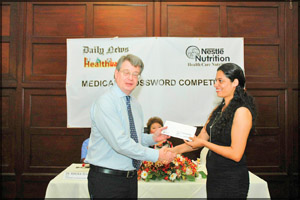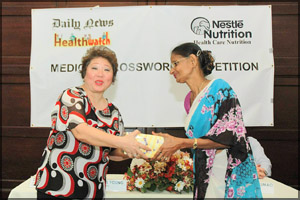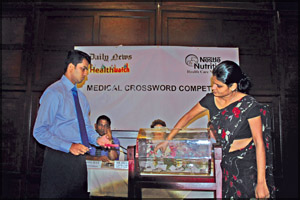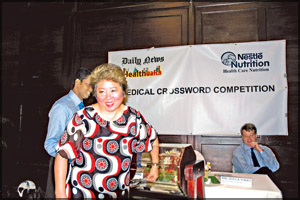|
Healthwatch
|
Compiled & coordinated by Edward
Arambewela |
Work related stress
Dr. Ruwan M. Jayatunga MD
Annually a large numbers of employees undergo health related problems
following work related stress.
This is an invisible phenomenon which has to be considered very
seriously by the health authorities. Unfavourable work conditions, over
work, work place harassments lead to various stress related illnesses
among the employees.
 The
right to work is fundamental to all humans according to the Universal
Declaration of Human Rights issued by the UN. Work satisfies the human
desire to be productive member of society and to have a purpose in life. The
right to work is fundamental to all humans according to the Universal
Declaration of Human Rights issued by the UN. Work satisfies the human
desire to be productive member of society and to have a purpose in life.
When these rights are violated workers experience different types of
stress related conditions and naturally their productivity decrease.
This is a nation wide problem that is not addressed in a larger scale.
Burnout
Burnout is a frequent manifestation of job related stress. Burnout is
defined as a state of physical emotional and mental exhaustion that
results from long term involvement in work situations that are
emotionally demanding.
Burnout is commonly associated with work situations in which a person
feels over worked, under appreciated and confused about expectations and
priorities given responsibilities that are not commensurate with pay
increase about lay offs and over committed with work responsibilities.
Contributors to burnout include excessive amount of work, role
conflict and the perception of being unfairly treated on the job.
Adjustment disorders
Anxiety related disorders especially Adjustment Disorder are common
among the workers that undergo severe job related stress.
Adjustment disorders generally develop within a month or so after a
significant life changes loss or event. it is a short term condition
that occurs when a person is unable to cope with or adjust to particular
source of stress.
An adjustment disorder can have a wide variety of symptoms which may
include stress related physical symptoms (unspecified headaches,
backaches, palpitations etc) mild to moderate depression and behavioral
changes.
Sometoform Disorders
As a result of work related stress people can develop various types
of sometoform disorders as well. Sometoform disorders are physical
ailments with no authentic basis.
Unspecific headaches, joint pains, stomach problems etc are common
among the affected personnel. They have long history of medical
treatment with a wide range of investigations and associated symptoms of
depression and anxiety.
Stress and trauma are concept used in both medical and psychological
literature to refer to unusual events, significant change or treat
demanding special bio-behavioral or psychological adaptive responses by
the individual in order to maintain psycho physiological equilibrium and
well-being. The stressor is the event that triggers the change or the
threat.
Negative stress coping methods
When facing work related stress people often go in to negative stress
coping methods such as high intake of alcohol, cigarette smoking and
sometimes substance abuse. These types of negative stress coping methods
lead to a wider range of medical problems.
Uncontrolled stress
Job related stress is a state of tension that is created when a
person responds to the demands and pressure that come from work.
Uncontrolled stress can lead to hypertension, and heart problems as
well. Therefore severe stress factors generated in the work places must
be controlled.
Overcoming work related stress
In the mean time we must forget that there have been a number of
suicides following work related stresses. In order to prevent this type
of catastrophes active measures must be implemented.
Positive man management, creating favourable working environments,
introducing counselling services can overcome the negative effects of
work related stress.
In many respects:
Regionally our healthcare service an example to others
Prof. Lalitha Mendis who was inducted in office as President of the
Sri Lanka Medical Association (SLMA) on Monday (January 14) has made
this observation in an article. She had written in the SLMA news
bulletin of September 2006 on the theme - National Health Policy.
In this article writing as the Chairperson of the SLMA National
Health Policy. Committee she states: “Sri Lanka’s National Health
Service is a massive operation involving nearly 600 hospitals 60,000
patient beds and 100,000 employees, operating on a shoestring budget of
only 1.8 of the GDP.
“However in many respects it stands out as an example in the region
which can be perfected to be our national pride with added cost
effective measures. State-of-the-art general and financial management
and an elevated level of professionalism”.
Why yet another health policy document
Referring to the National health Policy she writes, “It may be asked
why Sri Lanka which has had especially in the last fifteen years or so,
a surfeit of health policy documents, strategic frameworks, task force
documents and master plans should need yet another health policy
document. Notwithstanding the fact that the Ministry of health has
indeed made progress and achieved much in recent times.
It was felt that with regard to previous documents, there had been a
failure of implementation of accepted policies in a systematic and time
based manner. “Furthermore that the monitoring of progress made had been
poor.
Also the health needs of the nation are in a continuous state of flux
and this warrants frequent periodic evaluation, followed by
reprioritisation of policies and action eg. a reprioritisation was
required when the tsunami occurred and perhaps now, in the face of the
recent increase of Internally Displaced Persons (IDPS). The relative
importance of different causes of mortality and morbidity may change.”
Reasons for SLMA document
“These were some of the reasons for the SLMA developing yet another
national health policy document. The document was circulated to all
professional colleges and the Organisation of Professional Associations
(OPA) and finalised after a joint meeting with these bodies.
Thus the SLMA-NHP document is published in this newsletter as the
collective vision of doctors of how the Health Ministry should progress.
Health policy and its outcomes are the concern of many is born out by
the fact that the 2006 annual session of the OPA was devoted entirely to
“Health in Sri Lanka Challenges and Responses.”
Permanent standing committee
The document contains general directional policies from which
operational policies should flow.
There are clear recommendations for the setting up of a permanent
standing committee with representatives from the SLMA and Ministry of
health to monitor progress of operational policy formulation and
implementation.
Public-private partnership
The main thrust of the SLMA document is on equity of distribution of
healthcare inclusive of vulnerable population groups, IDPs and victims
of disasters, empowering of the community and investing more on
preventive services, enhancement of primary care leading to a national
scheme of general practice and referral system combating malnutrition,
human resource development and medical and allied medical personnel in
keeping with contemporary and projected need efficient management of
financial and human resource, establishment of state-of-the-art
management information system, and the encouragement of private-public
partnership.
Our Medical Crossword
A way forward in health education:
|

Chief guest Stuart Young Managing Director Nestle Lanka Ltd.
handing over the first prize to winner in medical crossword no.
29 G. L. Wijesinghe. |
At our 30th Healthwatch Medical Crossword draw held last week at
Galle Face Hotel, Colombo, Nestle Lanka commended this novel health
education.
It was described feature, which is one of our own creations in using
the crossword feature in the daily press media specifically for health
education as a very effective and motive way forward in health education
introduced by the daily press (Daily News) for the first time in Sri
Lanka and could be in the world too Mr. Stuart Young (Managing Director)
of Nestle Lanka (Ltd) said at the 30th Medical crossword draw where he
was the chief guest.
Young and Jessica Tumao (AOA) Nestle Health Care Nutrition who was
the guest of honour at this event both took copies of the Daily News
Medical page where the article on - Choosing your life’s Partner
correctly in the medical way was published.
Healthwatch Medical
crossword
|

Dr. Kelum Palpola receiving his prize for drawing the grid for
MC no.30 from Dr. Renuka Silva. |

Jaquiline Levers receiving her winning prize in crossword no. 29
from Stuart Young. |
|

Chief guest Stuart Young Picking first prize
winner in MC no. 30. |

Jessica Tumao of Nestle handing over a consolation prize to
Nihara Mass. |
|

Dr. Thivanka Karawita of Healthy Life, Colombo 3 picking Healthy
Life Consolation prize winners of the Medical Crossword. |

Jessica Tumao (AOA) Nestle Healthcare Nutrition Picking a prize
winner. |
No. 30 Prize Winners
The following are the prize winners of Health Watch Medical Crossword
No. 30 (sponsored by Nestle Health Care Nutrition). The winners were
picked at the crossword draw held on Monday January 7, at 11 am at the
Lotus Lounge Galle Face Hotel, Colombo with Mr. Stuart Young, Managing
Director Nestle Lanka Ltd. as the Chief Guest.
1st Prize: Rs. 3,000
N. Samsudeen (Entry No. EL 23)
210 Park Rd. Colombo 5.
2nd Prize: Rs. 2,000
Zakeena Soeb (Entry No. 1)
19 Skelton Rd. Colombo 5 (an A/Level Science Student).
3rd Prize Rs. 1,000
Chiara Alles Ramachandra (Entry No. 3)
49, Horton Place, Colombo 7.
(She is a full member (MCIM) of the Chartered Institute of Marketing
U.K.)
Consolation Prizes (of
one month supply of R/H)
(1) Lakshmi Samaranayake (Entry No. EL 10) Colombo 5. (2) Indra
Padmini Gunaratne (Entry No EL 1) Yakkala. (3) Darshana Abeysinghe
(Entry No. 6) Hokandara.
Consolation Prizes of
Rs. 1,000 each (in gift vouchers) from Healthy Life (Pvt) Ltd. Colombo
3.
The winners were picked by
Dr. Thivanka Karawita.
(1) Entry No. 17: Nalinie de Croos, No. 27, Rukmani Devi Mawatha,
Negombo.
(2) Entry No. 3: R. K. Nathaniel, 21 1/2, 8th Lane, Colombo 3.
(3) Entry No. 18: P. S. de Croos, No. 27, Rukmani Devi Mawatha,
Negombo. |

